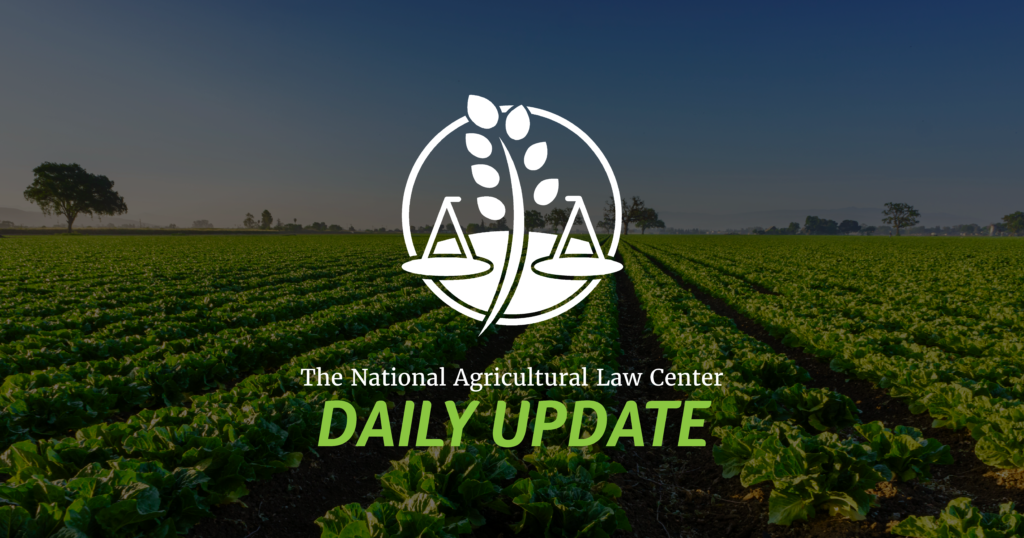A comprehensive summary of today’s judicial, legislative, and regulatory developments in agriculture and food. Email important additions HERE.
JUDICIAL: Crop Insurance, Pesticides
In Elbert v. United States Dep’t of Agric., No. CV 18-1574 (JRT/TNL), 2022 WL 2670069 (D. Minn. July 11, 2022), Plaintiffs, dark red kidney bean farmers from Minnesota, purchased revenue insurance coverage—the Dry Bean Revenue Endorsement (“Endorsement”)—to protect against a decline in bean prices as measured by the difference between the spring projected price and the fall harvest price. In 2015, such a decline occurred. There was also insufficient published pricing data to establish a harvest price under the Endorsement’s default harvest pricing method. The harvest price was then set as equal to the projected price per the contingency pricing terms of the Endorsement. Plaintiffs, therefore, received no compensation. Plaintiffs brought claims under the Administrative Procedure Act (“APA”) against Defendants—the United States Department of Agriculture (“USDA”), the Risk Management Agency (“RMA”), and the Federal Crop Insurance Corporation (“FCIC”)—arguing that it was arbitrary and capricious for Defendants to allow the Endorsement to convert their revenue coverage into yield protection. After the Court granted summary judgment to the Defendants, Plaintiffs received permission to file a motion to reconsider. Upon reconsideration, the Court concluded the Defendants had violated the APA. The Court then reversed its prior decision and denied summary judgment to the Defendants and granted summary judgment to Plaintiffs.
The Court then ordered the parties to submit additional briefing to address what remedy the Court should grant. The Defendants requested the Court remand to the FCIC for further consideration without vacating the existing policy. Plaintiffs requested the Court reform the insurance policy contracts to state that the FCIC will establish a harvest price when there is insufficient published data to otherwise set a harvest price and then order the FCIC to establish a price for 2015. Plaintiffs also moved to certify a class. In accordance with the default remedy for APA violations, the Court vacated the existing agency action and remanded to the agency for further consideration. Vacating was appropriate instead of leaving the Defendants’ action intact because of the serious procedural failures and because it was unlikely the Defendants made the correct choice by approving the Endorsement. Remanding was appropriate because the Defendants have the relevant expertise and are better positioned in the first instance to balance the impact on various stakeholders of any change to the policy.
In Carson v. Monsanto Co., No. 21-10994, 2022 WL 2678779 (11th Cir. July 12, 2022), Carson filed suit against Monsanto, the manufacturer of Roundup®, on December 5, 2017. In his four-count complaint, Carson alleged strict liability for a design defect under Georgia law (Count I); strict liability for failure to warn under Georgia law (Count II); negligence under Georgia law (Count III); and breach of implied warranties under Georgia law (Count IV). Monsanto filed an answer to the Complaint and subsequently moved for judgment on the pleadings. The District Court partially granted the motion. The District Court ruled that Carson’s Count II failure to warn claim was preempted under FIFRA because the EPA had classified glyphosate as not likely to be carcinogenic to humans and ruled that Carson’s Count IV breach of implied warranties claim under Georgia law was preempted for the same reason. The District Court also dismissed Counts I and III for the strict liability design defect and negligence to the extent that those claims related to how Roundup® was labeled or packaged. Carson moved to amend his complaint to dismiss Counts I and III of the complaint pursuant to a settlement agreement with Monsanto but preserved his right to appeal Count II, the failure to warn claim. The District Court granted that motion, thereby eliminating Counts I and III from the Complaint. Carson timely appealed the District Court’s judgment on the pleadings as to Count II.
On appeal, the Court was tasked with deciding whether the District Court erred in concluding that Carson’s failure to warn claim was preempted under FIFRA because the EPA had classified glyphosate as not likely to be carcinogenic to humans and approved the Roundup® label. The Court concluded it did, reversed the District Court’s ruling, and remanded for further proceedings.
REGULATORY: EPA, FWS, NOAA
ENVIRONMENTAL PROTECTION AGENCY
Notice announcing the EPA’s addition of certain water quality limited waters to the 2018 New York list of impaired waters requests public comment. Info here.
Final rule announcing that EPA is updating the list of chemicals subject to toxic chemical release reporting under the Emergency Planning and Community Right-to-Know Act and the Pollution Prevention Act. Info here.
FISH AND WILDLIFE SERVICE
Notice announcing FWS received the priority lists of wildlife and sport fish conservation projects from the Association of Fish and Wildlife Agencies for Federal fiscal years 2019, 2020, 2021, and 2022. Info here.
NATIONAL OCEANIC ATMOSPHERIC ADMINISTRATION
Notice announcing that NOAA/NMFS has received a request from the U.S. Department of the Air Force for authorization to take marine mammals incidental to testing and training military operations proposed to be conducted in the Eglin Gulf Test and Training Range from 2023-2030 in the Gulf of Mexico. Info here.
